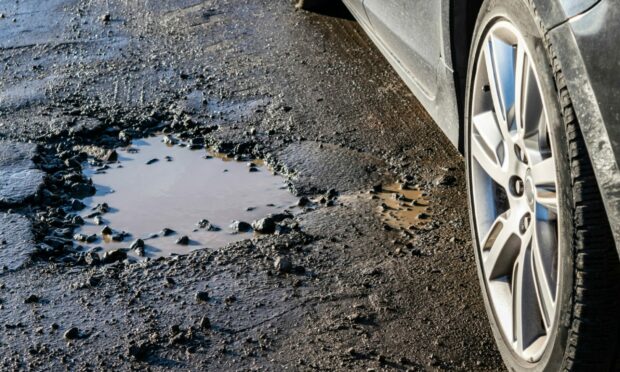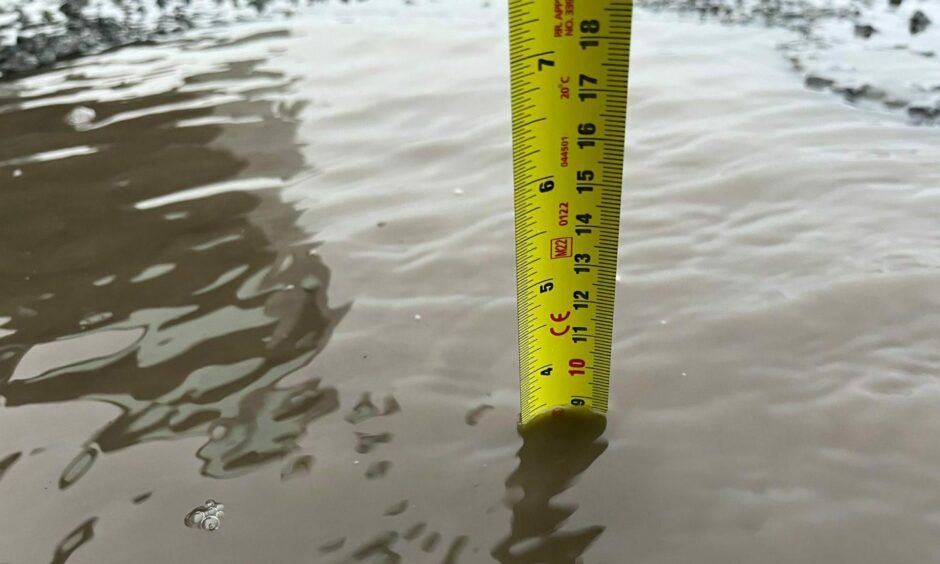Businesses in Skye fear that lives will be lost during the tourist season because of the state of the island’s roads.
They say collisions are inevitable with thousands of extra vehicles on the roads having to dodge potholes several inches deep and many feet wide.
Visitors who have had cars damaged by potholes previously have cancelled return trips.
Hospitality operators say just a 10% drop in tourist numbers would cost the island £26 million and 300 jobs.
Potholes several inches deep
They want the Scottish Government to intervene and fund repairs to protect the industry and “prevent the strong possibility of a series of tragedies”.
The issue is being taken up by the board of SkyeConnect, the island’s destination management organisation.
The group expressed concern “that lives will be lost this summer as a direct consequence of the state of many of Skye’s roads.
“This may sound alarmist, but it is a genuine fear as we have all experienced having to swerve onto the opposite side of the road to avoid potholes several inches deep and several feet in diameter.
“Such dramatic manoeuvres may be possible in the quieter winter months. But what will happen when the tourist season is in full swing and thousands of additional cars are on the road? Collisions are inevitable.”
SkyeConnect members have reported visitors saying they will never return to Skye as a direct result of the state of the roads.
“At this point in time, we are more concerned about potential injuries and loss of life.”
It says Highland Council is doing everything within its means to patch the worst potholes.
However, its budget is inadequate to tackle major resurfacing needed across much of the island.
“We believe expenditure on roads in Skye and Lochalsh must be viewed as an investment in the £260 million visitor economy that employs 2850 people.
“We urge the government to step in and provide the necessary funding to protect our key industry and prevent the strong possibility of a series of tragedies on our roads this summer.”
People are suffering and the island’s reputation is affected
Jennie Chapman, who owns the Atholl House hotel in Dunvegan, says everyone’s ultimate fear locally is that the situation will cost lives.
“The first concern is for people’s safety, not just for tourists but also for locals who have to put up with this all the time.
“I’m genuinely concerned about the safety of the roads. People are really suffering and the reputation of the area is significantly detrimentally affected.
“We’ve been really upset at seeing how distressed and shaken and worried people have been.”
She said in one week she counted eight separate parties who had vehicles damaged by potholes.
People say they won’t come back because they are terrifed to drive on the roads
Jennie Chapman
“It’s a huge issue. One lady arrived very distressed after dark having had a blow-out.
“She was on her own, in the dark in an area she didn’t know and she couldn’t get to her destination.
“Equally, there are people who should have stayed with us but couldn’t get here because they had blow-outs. It’s just crazy.
“Many people have said they love Skye but won’t come back because they are terrified to drive on the roads. That’s pretty awful.”
In January, lawyer Katy MacKay shared a video online about the state of the island roads.
She said the council roads are “virtually undriveable”.
Earlier this month, Highland Council agreed to increase funding to improve roads by over £14 million, including £1.26 million to tackle potholes.
Economy and infrastructure committee chairman Ken Gowans said investing in roads and infrastructure is a high priority and is fundamental to connectivity and the Highland economy.
The Scottish Government said its settlements from the UK Government have suffered a decade of austerity with average real terms cuts of over 5%, equal to a loss of £18 billion.
Despite this, local government funds have risen in 2023-24 by more than £793 million.
Additional funds would require cuts elsewhere
A spokeswoman said: “Maintenance of the local road network is the responsibility of local authorities.
“It is up to councils to manage their own budgets and allocate the total financial resources available to them on the basis of local needs and priorities.
“Any call for additional funding of this type would require cuts to be identified in other areas.”
Are you interested in more exclusive and breaking Highland and Islands news from The P&J? If so, why not join our dedicated Facebook page HERE.



Conversation